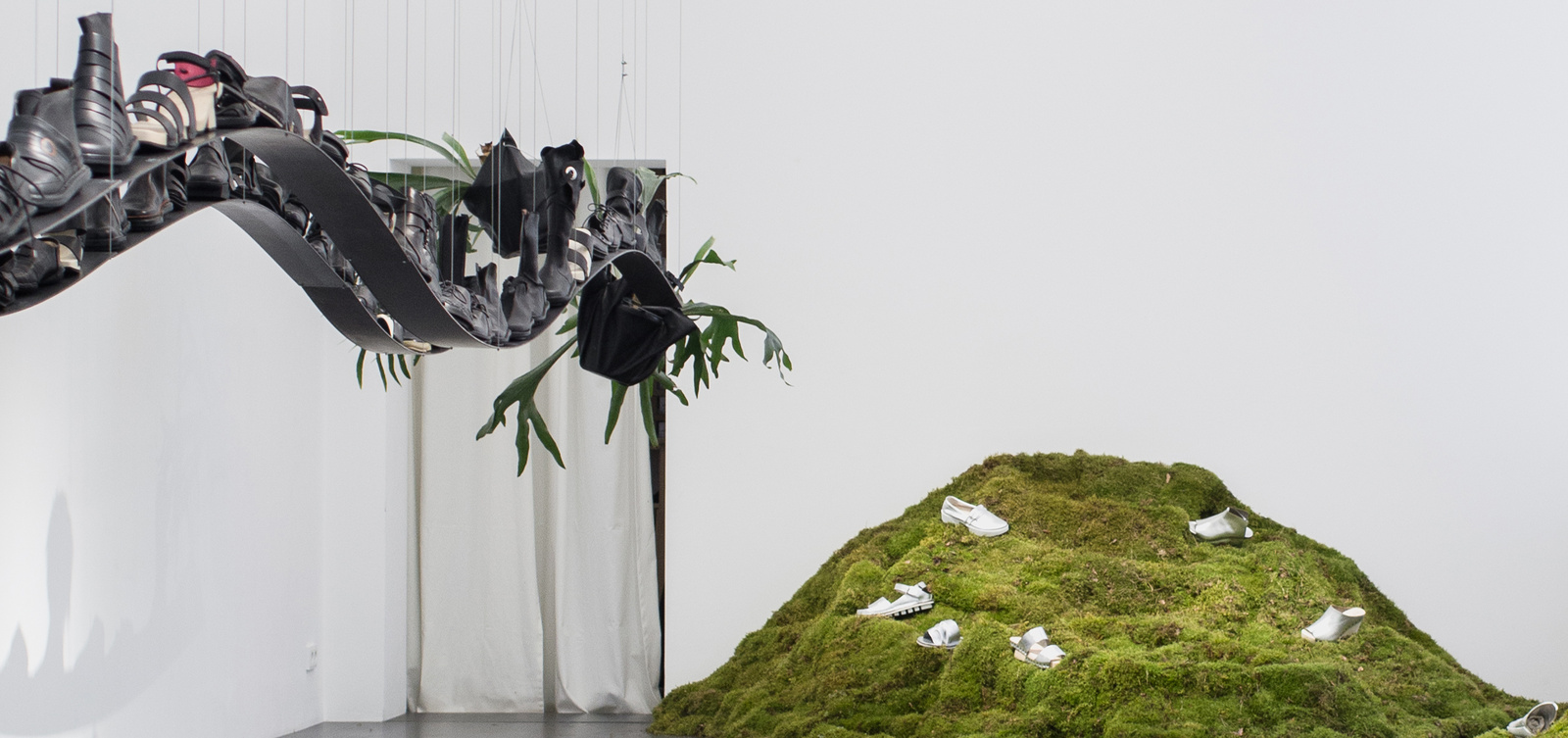
Our Sustainability Skills symbols are a visual tool designed
to clearly highlight the more sustainable and responsible aspects
of each product.
Sustainable Skills
"We want to distance ourselves from mainstream greenwashing and share how our ideas are implemented." — Michael Oehler, CEO
Our Sustainability Skills symbols are a visual tool designed to clearly highlight the more sustainable and responsible aspects of each product—covering materials, production methods, components, health impact, and longevity.
At the core of this system is transparency—a matter of trust we strive to earn not through certifications, but by openly sharing our sustainability journey.
You’ll find these symbols on every product page, thoughtfully paired with the features of each individual style.
Undyed
Choosing undyed leathers significantly reduces water consumption during production.
Vegetable-tanned leathers, when left undyed, have a natural light beige-brown tone that gradually deepens into a rich cuoio brown over time. Chrome-free tanned leathers, by contrast, retain a soft, milky-white appearance in their undyed state.
Vegetable tanned
This leather is tanned using a traditional, plant-based method.
The primary active agent is tannin, naturally found in oak bark, rhubarb roots, and other plants. As an ancient and ecological alternative to the widely used chrome tanning process - which is fast and inexpensive but generates significant chromium waste - vegetable tanning offers a more sustainable approach.
Our premium vegetable-tanned leathers come from traditional tanneries in Tuscany. Over time, this leather ages beautifully, developing character as its colors deepen into rich, brownish tones.
The leather working group
The leather is sourced from tanneries certified by the Leather Working Group—an international organization of brands, manufacturers, retailers, and NGOs working to monitor and reduce the environmental impact of leather production.
The group promotes responsible practices through a detailed Life Cycle Assessment (LCA), which evaluates the environmental cost of a product from raw material sourcing and production to use and eventual disposal.
Nearly all of our leather comes from Italian tanneries that are LWG-certified and committed to continuously improving their environmental performance.
Metal Free
This leather is tanned without the use of metals.
While chrome tanning has become safer over time, its environmental risks still persist. In addition to our vegetable-tanned leathers, we also use leather tanned with formaldehyde—free of chrome and other metals—which is particularly suited for very light colors, as it does not darken with age.
Adhesive free
We use almost exclusively water-based solvents and adhesives, which are not only more environmentally friendly but also healthier for our shoemakers. However, certain manufacturing processes still require the use of solvent based adhesives to meet the necessary standards of durability and longevity. Here we use air extraction systems to protect ourselves from strong smells.
Plastic component free
The shoe contain no additional plastic components. Thanks to innovative design and production techniques, we’ve successfully eliminated from some styles extra plastic parts without compromising quality or performance.
Re-Treads
The unique longevity of our shoes arises from the sewn on, highly durable rubber soles which can be repeatably removed and renewed, coming as close as possible to a completely adhesive free shoe. Our diversity of design means some models are easier to resole than others, but generally it is always possible. The old rubber soles are collected for recycling.
Circular Materials
The style contains some recycled component.
The circular sole made of 50% recycled post consumer trippen soles collected from our repair workshop, 25% virgin natural rubber, and 25% virgin synthetic rubber. Additionally, the upper may be crafted from recycled yarns or innovative materials developed by reusing leftovers and cutouts from our leather shoe production.
Natural (Indian) rubber
The soles are made from biodegradable natural rubber.
Natural gum rubber is an untreated alternative to conventional treated rubber. Because it is not vulcanized, it remains biodegradable.
This rubber is sourced from the rubber tree (Hevea brasiliensis), which grows primarily in Southeast Asia and Central and South America.
It should not be confused with synthetic rubber, which is derived from petrochemical sources.
Native timber
The soles are crafted from native European timber. The wood is completely untreated - natural, breathable, and gentle on the feet - offering comfort as well as environmental benefits.
Vegan
The shoe is vegan according to our interpretation of the term.
“Vegan” can have many meanings when applied to footwear. For us, it means that no materials of animal origin are used, and no animal testing is involved at any stage of production.
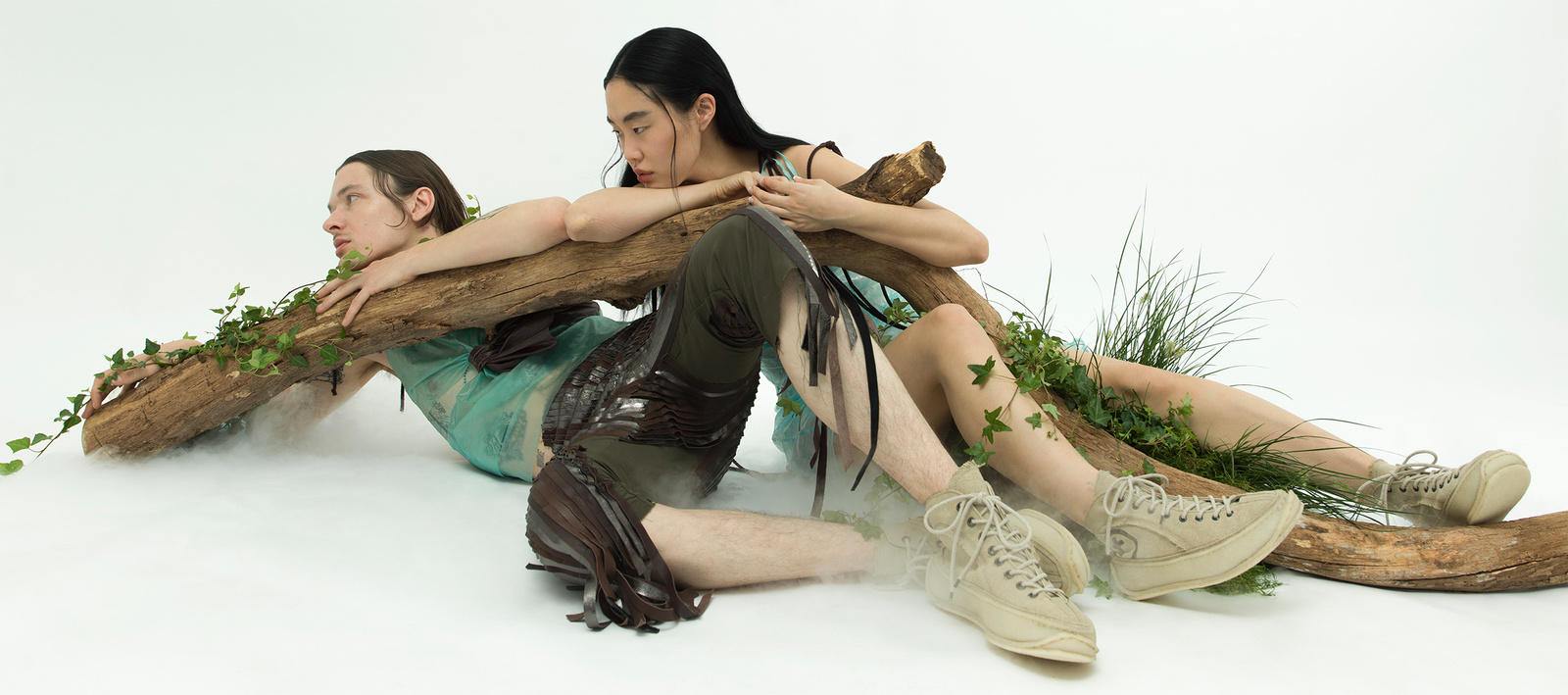
Our latest circular and Zero Waste material innovations
form the core of our t-project line.
Innovative Materials
Practicing Zero Waste in fashion means adopting strategies that reduce or eliminate waste throughout the entire life cycle of clothing and accessories. The focus is on minimizing waste, particularly during the production and disposal stages.
From the very beginning, longevity, the interchangeability of shoe components, and the Zero Waste concept have been key aspects of our design process. Because of this, we have consistently collected post-consumer soles from our resoling service, B-quality soles, leather scraps, and prototypes over the years. These materials now serve as the foundation for our latest circular and Zero Waste innovations, which form the core of our t-project line.
Smaller leather cutouts have been transformed into jewelry or a smooth, new leather material by gluing and sanding them together (Aura and Ambience). Larger leather scraps from bag production have been reassembled into small, intricate lines for models such as Clearcut and Enfold. Prototypes, an unavoidable byproduct of the design process, have been given new life in the Proto style. Additionally, since August 2023, the 18 tonnes of worn-out and B-quality soles we have collected over the years have been repurposed into our recycled soles, allowing them to take another step forward.
Discover our t-project line here
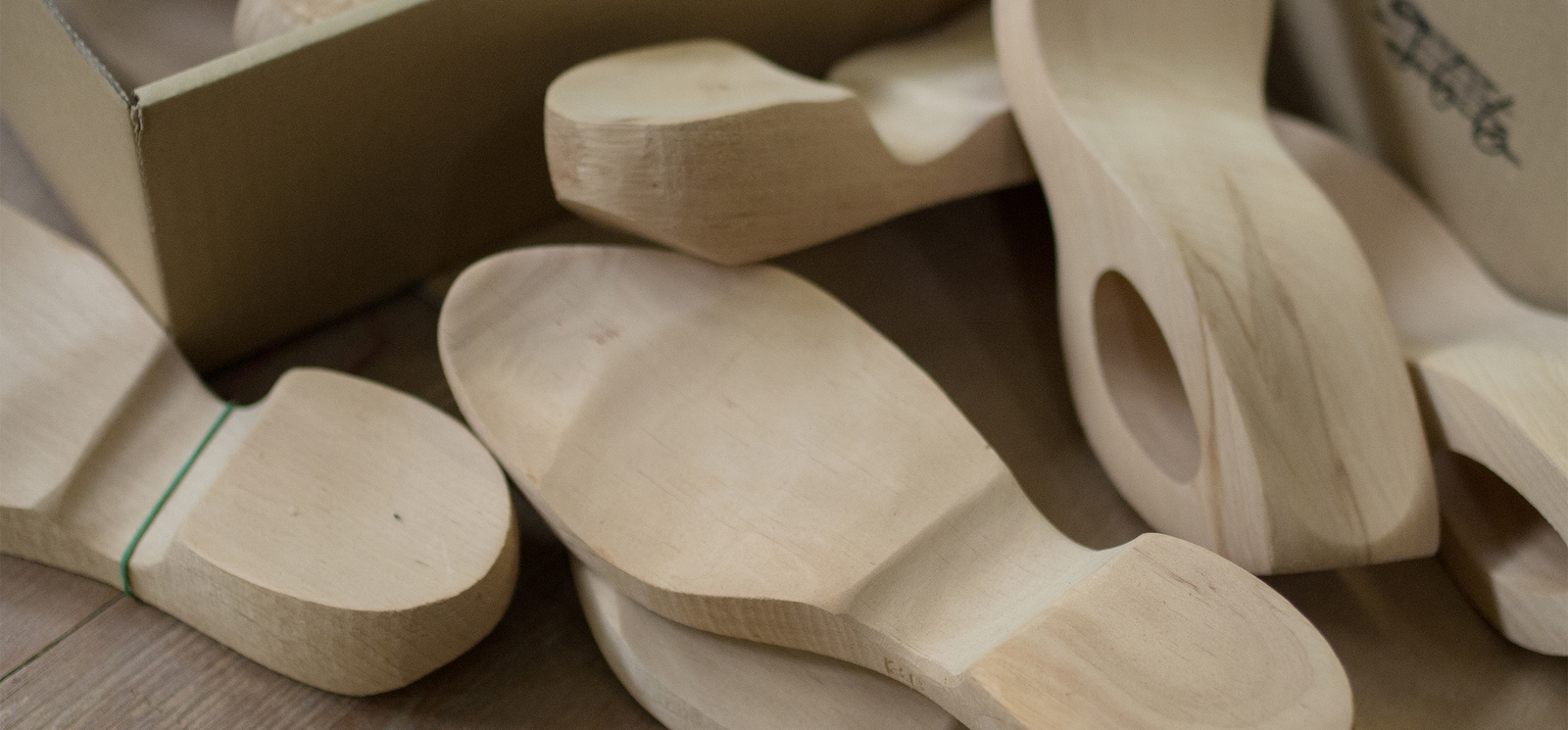
Wooden soles were our first stage of experimentation -
a renewable material sourced from Europe.
Wooden Soles
Wooden soles were our first stage of experimentation—a renewable material sourced from Europe. The choice of wood varies by design, with alder, beech, and poplar being the most commonly used. Alder, known for its durability, is ideal for most flat wooden soles. Poplar, exceptionally light and delicate, is reserved for high platform soles. Beech, dense and sturdy, is perfect for high-heeled designs.
Our wooden soles remain untreated, allowing them to naturally absorb moisture. This makes them not only comfortable to wear but also beneficial for foot health.
However, wooden soles are not suitable for winter. This led to the challenge of creating rubber soles that are both long-lasting and recyclable.
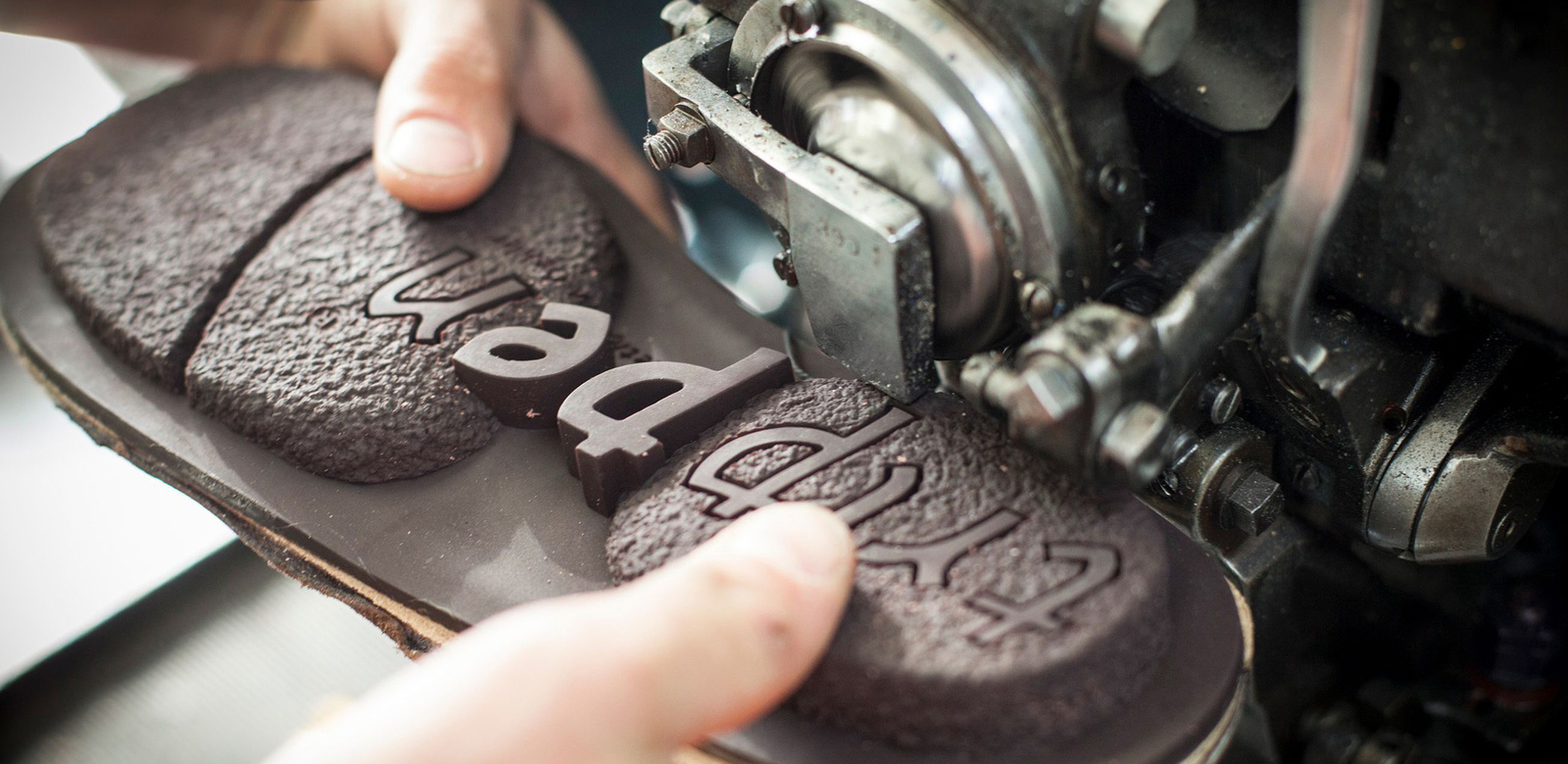
We have designed a series of rubber soles
with ease of repair in mind.
Rubber Soles
Developing soles that are suitable for winter, durable, and recyclable was a major challenge.
After careful consideration, we reluctantly chose petroleum-based rubber as the most durable option. We developed the easily replaceable “Closed” sole and introduced a resoling service. Since then, we have designed a series of rubber soles with ease of repair in mind.
The repair service has been a success: on average, we resole 20 pairs of shoes per day in Germany and nearly the same amount in Japan.
Over the years, we have collected many tons of replaced soles, which we have recently begun repurposing into recycled soles. Our rubber soles are produced in Italy.
Closed Line
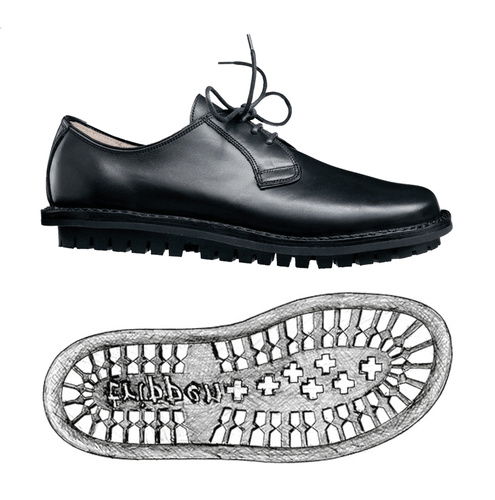
Closed 1994
Closed 1994. The Closed collection is built to last. These shoes feature an anatomically shaped cork insole and a patented design technique that allows them to be taken apart, repaired, and refreshed. The soles aren't just glued but also stitched, making them fully replaceable and eco-friendly. Each pair features a removable cork footbed covered with vegetable-tanned leather.
Awards: Baden-Württemberg International Design Award, I.D. International Design Award, Good Design Award, German Federal Ecodesign.
Care instructions
See all Closed Line soles variations
Cup Line
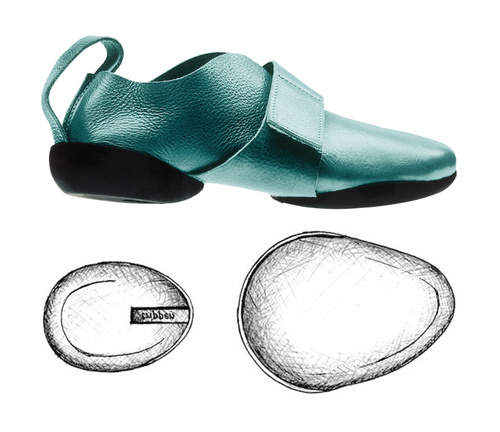
Cup 1998
The Cup collection is all about the barefoot feeling. Designed to be ergonomic and ultra-light, it features a two-part sole that cushions the heel and ball like protective shells. The upper is soft and flexible, while the insole—moulded from thick, vegetable-tanned leather—follows the foot’s natural shape for arch support and structure.
Awards: Good Design Awards in Japan and the USA, Red Dot Award.
See all Cup Line soles variations
Penna Line
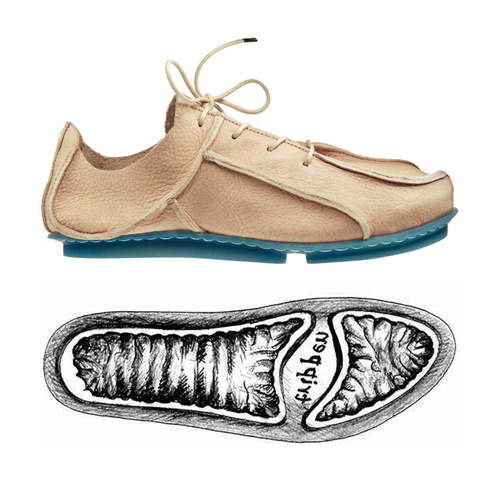
Penna 2003
The Penna collection rethinks construction. Using a sophisticated cutting technique, the uppers hold their shape without the need for reinforcements—making plastic-free designs possible. Soft leather is sewn directly onto flexible sole units, eliminating almost all solvent-based adhesives. The trampoline-like sole naturally absorbs shock, while the felt layer beneath the leather sock lets the foot form its own insole over time. Rooted in traditional craftsmanship, each pair may vary slightly—subtle differences that make every shoe unique.
Awards: 2004 Good Design Award.
x + os Line
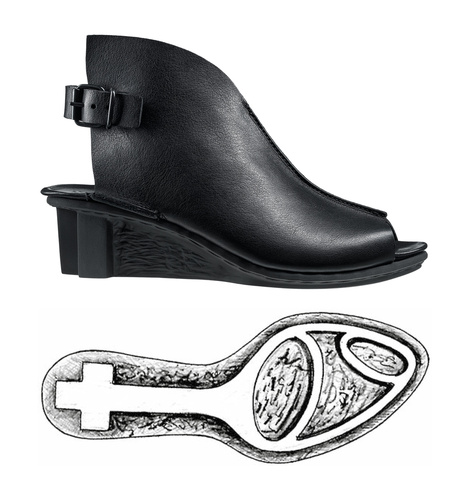
x+os 2006
Named after its sole shape—a cross and two ovals—the x+os collection is all about smart structure and lightweight design. A narrow wedge reduces weight, while the cross under the heel ensures lateral stability. At the front, two ovals follow the natural shape of the foot to support the ball of the foot and the toes. Similar in construction to the Penna line, x+os stands out with a more feminine, refined look, thanks to its 4.5 cm high heel.
Awards: iF product design award, German Shoe and Leather Goods Award, nominated for German Design Award 2008.
Box Line
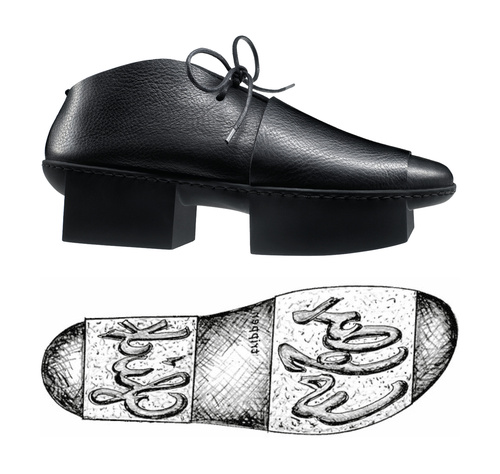
Box 2008
The Box collection explores the idea of a modern platform sole. The walking surface is reduced to two 4 cm high cube-like contact points, giving the sole its sculptural look. Air chambers within the sole and the rubber’s natural cushioning provide excellent shock absorption. A full-grain leather insole supports the structure and ensures a secure, comfortable fit.
Awards: 2009 Good Design Award, nominated for German Design Award 2011.
Care instructions
See in the Shop
See all Box Line soles variations
Happy Line
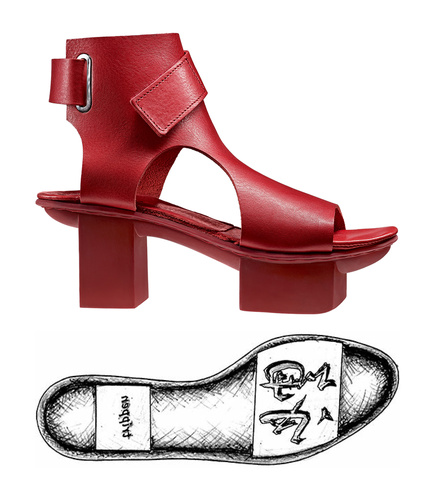
Happy 2008
Happy 2008. The Happy collection blends the look of high heels with our standards of comfort and function. The split design creates an optical illusion—appearing like a 6 cm high heel, but actually offering the comfort of a platform with just a 3 cm height difference. Durable, flexible, and recyclable, the rubber sole includes air chambers that reduce weight and enhance shock absorption. An internal construction stabilizes the sole, combining height with ease of wear.
The word “Luck” is written underneath the sole in Japanese characters
Awards: 2009 Good Design Award, nominated for German Design Award 2011.
Care instructions
See in the Shop
Splitt Line

Splitt 2012
The Splitt collection was designed as a sporty, winter-ready alternative to x+os. Its modern wedge sole has a 6 cm heel and built-in air chambers to reduce weight. Cut-out gaps in the sole add flexibility and improve the natural rolling motion while walking. Inspired by winter road grit, the textured surface offers excellent grip—and gives the collection its name.
Awards: 2013 Good Design Award, iF product design award 2014, SpecialMention 2015 German Design Award.
Care instructions
See in the Shop
Sport Line
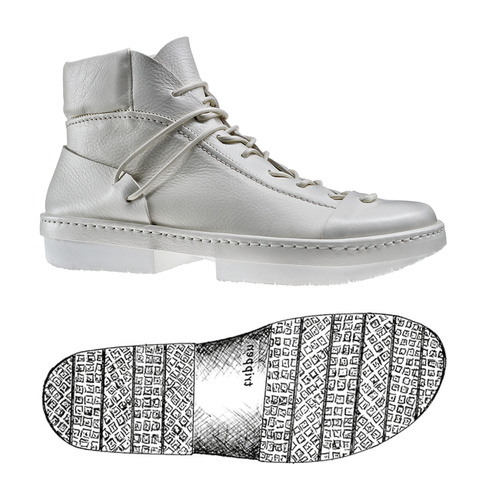
Sport 2012
The Sport collection builds on the Box sole with a focus on performance and everyday wear. Embedded air chambers reduce weight and offer excellent shock absorption, while a full-grain leather insole stabilizes the construction for a secure fit. For added grip, the sole’s profile—cut in two and reassembled—is inspired by the texture of standard rubber sheeting, enhancing slip resistance and adding a distinctive design element.
Awards: 2013 Good Design Award, nominated for German Design Award 2015.
Care instructions
See in the Shop
Gritt Line
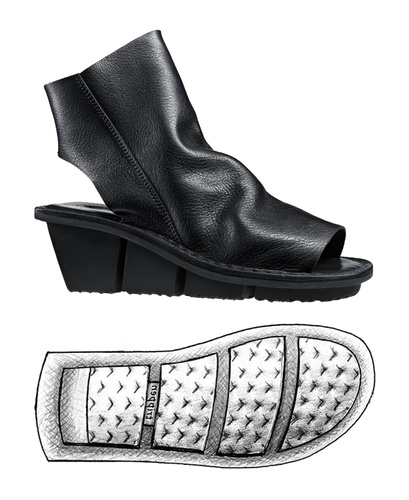
Gritt 2014
The Gritt collection introduces a new wedge sole with an inner construction designed to offer both function and comfort—true to the tradition of the Closed collection, but with added height. As with Closed, the rubber sole is stitched to the intermediate sole and upper, not just glued, making it easy to detach and replace. These styles come with an anatomically shaped cork insole, covered in vegetable-tanned calf leather. The heel is 6 cm high.
Care instructions
See in the Shop
Wave Line
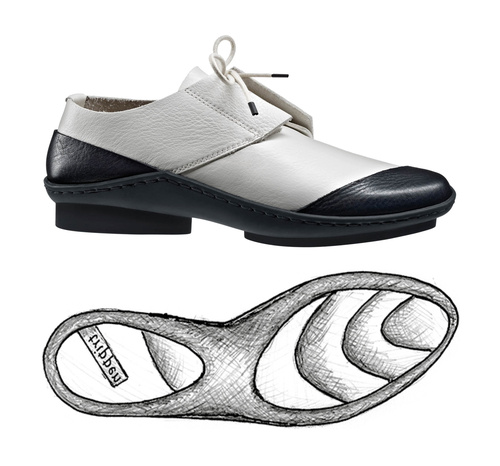
Wave 2016
The Wave collection evolves the design of the Cup sole. Its continuous sole design protects against moisture, while the innovative tread pattern ensures reliable grip.
Care instructions
See in the Shop
Swan Line

Swan 2018
The Swan collection is defined by its sporty, minimalist style and signature undulating curved sole. Slightly offset contact points and elegant, flowing lines highlight the sole’s graceful design. A vegetable-tanned leather insole ensures optimal comfort. With its clear style and urban elegance, Swan offers a fresh take on Trippen’s time-honored tradition.
Care instructions
See in the Shop
Geisha Line
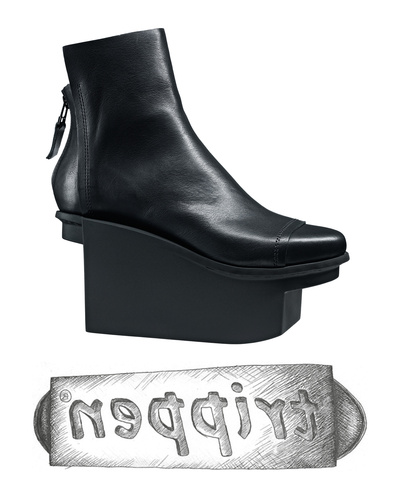
Geisha 2018
With its 11 cm sculptural platform sole, the Geisha collection takes the fusion of high heels, function, and comfort—first explored in the Happy collection—to a new level. The broad platform provides secure support despite the height. The cubist sole is stitched to the upper leather with thick yarn only at the front and back, creating a distinctive open space in the middle.
Care instructions
See in the Shop
Zero Line

Zero 2019
The Zero collection uses natural rubber instead of conventional rubber, with a sole shape designed to reduce rapid wear on the heel edge. Its extended sole creates elegant, flowing lines. We aimed to find a natural alternative to synthetic rubber while continuing to explore sustainable solutions.
Care instructions
See in the Shop
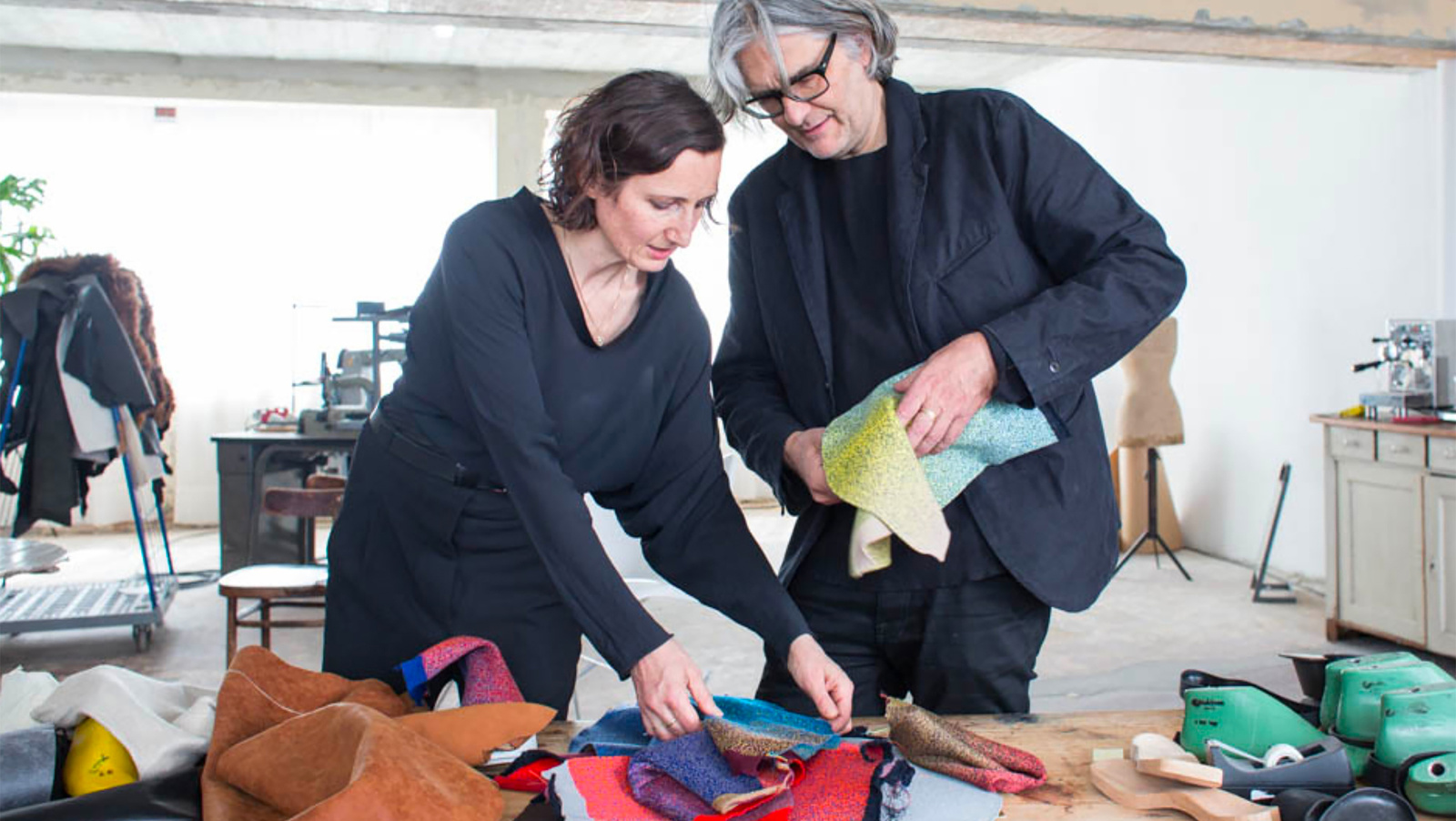
From day one, our primary choice has always
been vegetable-tanned leathers.
Leathers & Textiles
Selecting premium leather goes beyond appearance—it’s about the tactile experience: feeling, stretching, and even smelling the hides to truly understand their essence. At Trippen, we choose what’s most natural. Our leathers are only minimally pigmented, and treated with wax to give them a special depth. As a result, small marks and scratches that may appear are simply part of the animal’s natural skin, adding authenticity to the leather’s surface. This is what sets it apart from coated, printed, or standardized materials. From day one, our primary choice has always been vegetable-tanned leathers, sourced from long-standing partnerships with small tanneries in Tuscany, Italy.
Over 90% of our leathers are *LWG Gold certified. Unlike conventional methods that use chromium salts, vegetable tanning employs plant-based materials, such as tree bark, leaves and fruits to preserve and treat the leather. This method preserves the leather’s natural structure and allows it to age beautifully.
When it comes to textiles, we choose only more responsible materials—prioritising natural or recycled fibres that are ideally organic, recyclable, and sourced within the EU.
*Leather Working Group




waw
Vegetable-tanned calf leather sourced from an Italian (Tuscany) supplier. Some colors, mostly the light ones (such as white, perla, rose, sky, kobalt, lime, azur, pulpo, and coral), are not vegetable-tanned but metal-free tanned in order to keep the color stable. Features a through-dye and wax finish with a light pull-up effect. It is tumbled for softness, and color and texture may vary as a result of the tumbling process. The color will get darker with wear and exposure to sunlight. The dye can stain your feet. It gets softer with use and may stretch. The bi-leather colors are dyed twice and therefore display a different color edge.
Care guide











































acf - aspen chrome-free
Chrome-free, vegetable post-tanned calf leather sourced from a German supplier. Features an oiled surface and pull-up effect.
Marks and irregularities in color are natural characteristics of the leather. The color will get darker with wear and exposure to sunlight. It gets softer with use and may stretch.
Care guide





alb - albino
Metal-free tanned deer leather, sourced from New Zealand farmers and tanned in Tuscany, Italy. Features extreme softness, flexibility, and comfort without the use of chrome tanning. It is sensitive to scratches, abrasions, and stains. It gets softer with use, may stretch substantially, and generally ages faster than other leathers.















asp - aspen
Chrome-tanned calf leather sourced from a German supplier. Features an oiled surface and pull-up effect. It gets softer with use and may stretch. Not recommended for people with chrome allergies.
Care guide












bat - batik
Half vegetable-tanned, half metal-free tanned calf leather sourced from an Italian (Tuscany) supplier. Features a tumbled finish for softness.
Color and texture may vary as a result of the tumbling process. The color will get darker with wear and exposure to sunlight. It gets softer with use and may stretch. The vibrant colors are especially sensitive to staining, moisture, and scratches.
Care guide










bgl - bag leather
Vegetable-tanned calf leather sourced from an Italian (Tuscany) supplier. Features a covering coat of color and a tumbled finish for softness. Color and texture may vary as a result of the tumbling process. The color will get darker with wear and exposure to sunlight. Especially designed for our bags, it has a protective coating on the surface; however, it may still bleed when exposed to moisture.
Care guide





bglto - bag leather leftovers
Small leftovers of our bgl leather, repurposed in some T-Project zero-waste styles. Features the same protective qualities and finish as bgl leather.
Care guide





box
Chrome-tanned calf leather sourced from a German supplier. Features a covering coat of color and good color stability. It is more resistant to water stains and general signs of wear and tear. Not recommended for people with chrome allergies.
Care guide










box-h
Chrome-tanned calf leather sourced from a German supplier. Features a covering coat of color and good color stability. It is more resistant to water stains and general signs of wear and tear. Not recommended for people with chrome allergies.
Care guide

bug - buffalo shiny
Vegetable-tanned buffalo leather sourced from an Italian (Tuscany) supplier. Features a shiny surface and irregular texture. The color will get darker with wear and exposure to sunlight. It gets softer with use and may stretch.
It is sturdier than other leathers as a result of its thickness.
Care guide










buf - buffalo
Vegetable-tanned buffalo leather sourced from an Italian (Tuscany) supplier. Features an oiled surface and irregular texture. The color will get darker with wear and exposure to sunlight. It gets softer with use and may stretch. It is sturdier than other leathers as a result of its thickness.
Care guide

cap - capra
Long-haired chrome-tanned Tibetan goatskin. Features a soft, long-haired surface. Not recommended for people with chrome allergies.
Care guide







cav - cavallin
Chrome-tanned cow leather sourced from an Italian (Tuscany) supplier.
Features the natural cow hair structure on the surface. Not recommended for people with chrome allergies.
Care guide





cot - cotton
Soft cotton fabric, hand-dyed by us. Features unique batik patterns and color gradients on each piece. The fabric’s raw edges underline the casual grunge look. The batik colors can lighten over time due to sunlight exposure.
Care guide





crd - cord
Vegetable-tanned cow leather sourced from an Italian (Tuscany) supplier. Features a tumbled finish and an embossed surface with a striped pattern.
The embossing process increases its stiffness compared to other types, but with use it gradually regains some of its softness.
Care guide




ctn - cotton
100% recycled and GRS-certified cotton fabric from Switzerland. Features a special weaving process that creates a highly water-repellent surface.
No chemical additives or finishes are used, therefore it cannot be categorized as fully waterproof.
Care guide




der - deer
Vegetable-tanned deer leather sourced from an Italian (Tuscany) supplier. Features exceptional softness, rivaling our elk leather, with a slightly more robust surface thanks to the tanning process.
Care guide
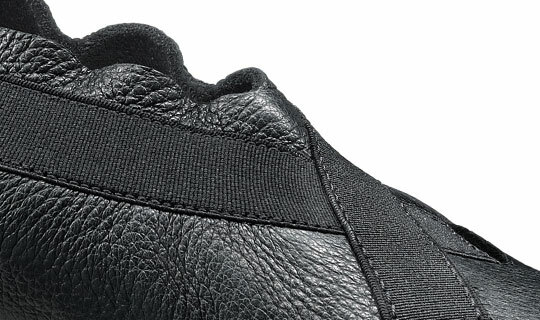


dev
Vegetable-tanned cow leather sourced from an Italian (Tuscany) supplier. Features a tumbled finish for softness and a thin layer of silvery, gleaming wax on the surface. The colors underneath remain clearly visible. The wax finish is relatively resilient but may wear away with intense friction.
Care guide
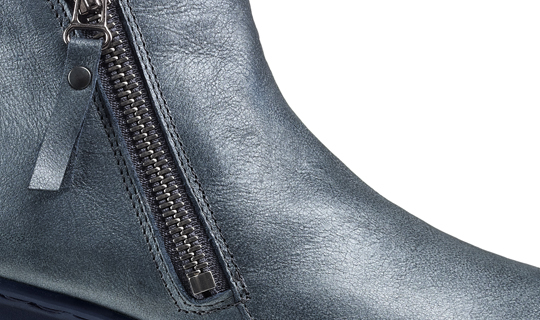




dplx - duplex
Vegetable-tanned calf leather sourced from an Italian (Tuscany) supplier. Features a double-dye process that creates a contrasting color edge. The color will get darker with wear and exposure to sunlight. The dye can stain your feet. It gets softer with use and may stretch.
Care guide
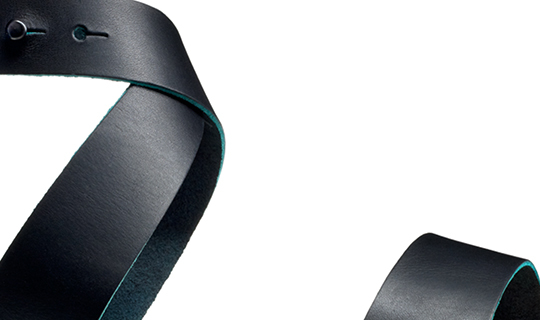




dpw
Vegetable-tanned, aniline-dyed calf leather sourced from an Italian (Tuscany) supplier. Features a tumbled finish for softness. Color and texture may vary as a result of the tumbling process. It is double-dyed, creating a contrasting edge. The color will get darker with wear and exposure to sunlight. The dye can stain your feet. It gets softer with use and may stretch substantially.
Care guide
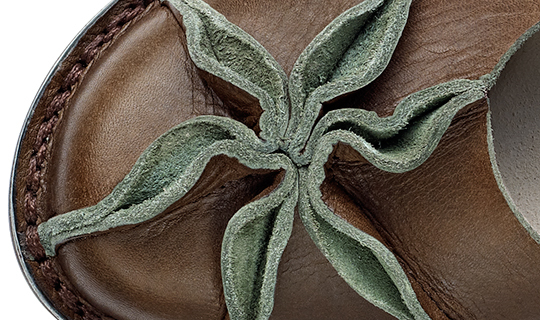












elk
Chrome-tanned deer leather sourced from an Italian (Tuscany) supplier. Features exceptional softness, flexibility, and comfort. It has a covering coat of color and a highly textured, irregular surface that is sensitive to scratches, abrasions, and stains. The dye can stain your feet. It gets softer with use, may stretch substantially, and generally ages faster than other leathers. Not recommended for people with chrome allergies.
Care guide
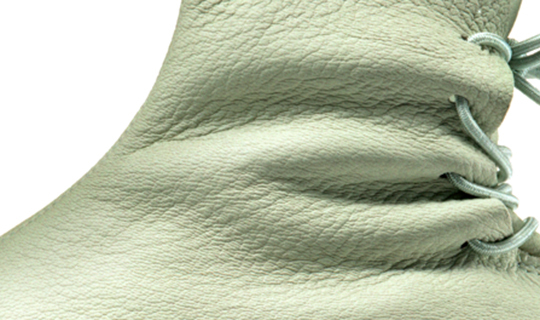









glm - glam
Vegetable-tanned, thin buffalo leather sourced from an Italian (Tuscany) supplier. Features a pull-up effect and an extremely shiny, hand-colored surface. The manual coloring gives the material a vivid look, but the color may stain your feet. The color will get darker with wear and exposure to sunlight. It gets softer with use and may stretch. The vibrant colors are especially sensitive to staining, moisture, and scratches.
Care guide
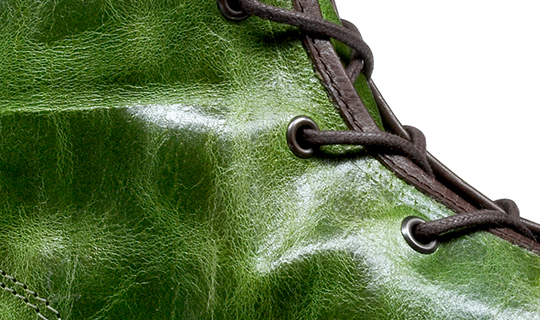



ice
Vegetable-tanned calf leather sourced from an Italian (Tuscany) supplier. Features a white soap-wax glazing that wears away with use, leaving a vintage look.
The color will get darker with wear and exposure to sunlight. It gets softer with use and may stretch.
Care guide
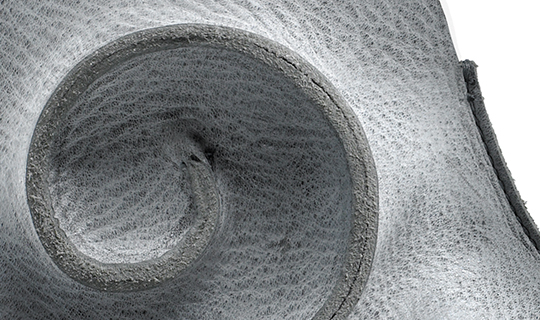








jea - jeans
Post-consumer jeans sourced from sorted clothing donations in Berlin, focusing on pure cotton composition. Features variations in shade, brightness, and thickness due to its origin.
These differences are expressed in the t-project styles "Aware" and "Beware".
Care guide





ken - kenya
Vegetable-tanned calf leather sourced from an Italian (Tuscany) supplier. Features a covering coat of color, an additional glossy varnish, and a light pull-up effect.
Care guide
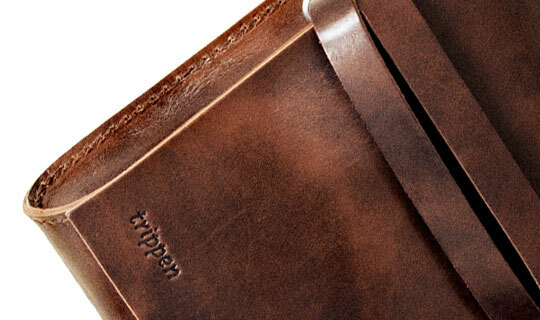

lam - laminato
Vegetable-tanned calf leather sourced from an Italian (Tuscany) supplier. Features a laminated surface with metallic-colored foil. Like all shiny leathers, it is sensitive to scratches and other surface damage. It gets softer with use and may stretch.
Care guide
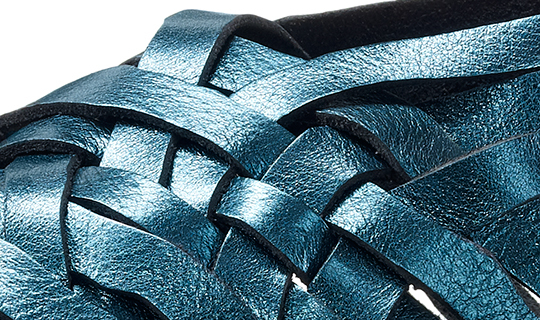














lav - lavato
Chrome-tanned, cotton-lined calfskin, dyed and hand-washed by us to create a batik effect. Features uneven coloring that makes each shoe unique. To us, this material is more than just leather — it is a piece of art. It can stretch unevenly, and color may bleed. Not recommended for people with chrome allergies.
Care guide
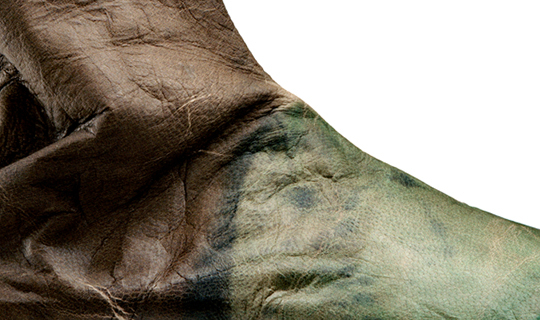









lea
Regenerated leather material developed in-house using offcuts accumulated during production. Features small rectangular scraps that are glued together into new sheets, which are then sanded to achieve a smooth surface.
Patches of vegetable- and metal-free tanned leathers blend almost seamlessly.
Care guide
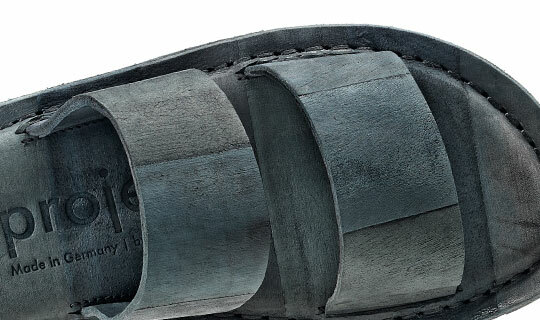














lff
Chromefree sheepskin. Features the natural shearling fur structure.
Used for lining and footbeds.


lht - light
Vegetable-tanned cow leather sourced from an Italian (Tuscany) supplier. Features a tumbled and washed finish. Due to the washing process, the colors fade and the leather’s structure becomes more visible.
The look recalls a favorite pair of washed-out jeans. It gets softer with use and may stretch.
Care guide
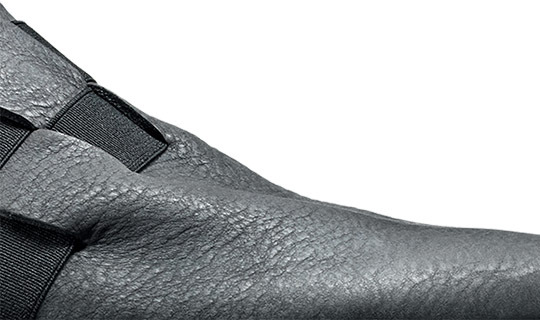




lux - luxury
Chrome-tanned calf leather sourced from an Italian (Tuscany) supplier. Features a covering coat of color, a tumbled finish for softness, and a glossy varnish.
The bright colors are resistant to fading. This elegant, delicate, and thin material is sensitive to moisture and heat. Not recommended for people with chrome allergies.
Care guide
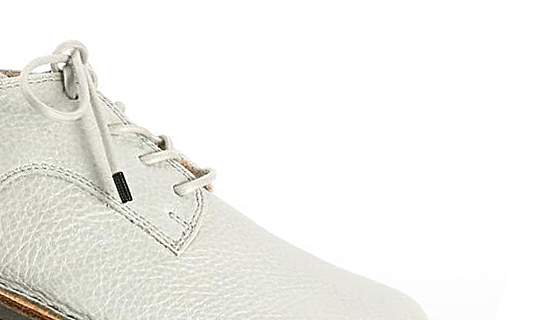





lxp
Vegetable-tanned calf leather sourced from an Italian (Tuscany) supplier. Features a subtle pull-up effect and a high-gloss surface. The glossy finish and brilliant colors ensure that this leather is the epitome of elegance. It gets softer with use and may stretch.
Care guide
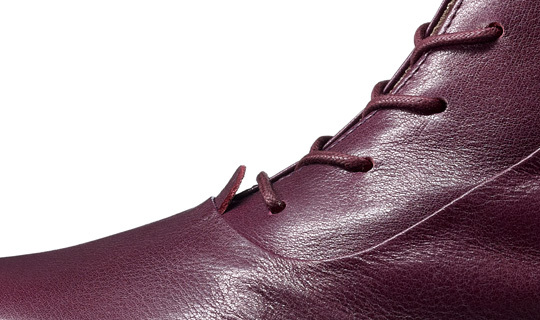















mfl - muflone
Chrome-tanned shrunk sheepskin sourced from an Italian (Tuscany) supplier. Features a heavily textured surface and irregular grain created by a shrinking process. It is extremely soft, flexible, and pleasant to wear. It gets softer with use, may stretch substantially, and generally ages faster than other leathers. It is sensitive to scratches, abrasions, and stains.
Not recommended for people with chrome allergies.
Care guide
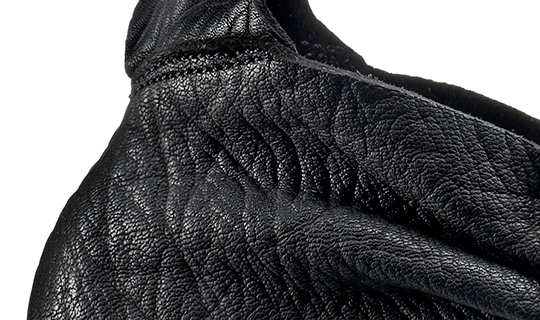











mon - montone
Chrome-tanned sheepskin sourced from an Italian (Tuscany) supplier.
Features the natural sheep hair structure on the surface.
Not recommended for people with chrome allergies.
Care guide
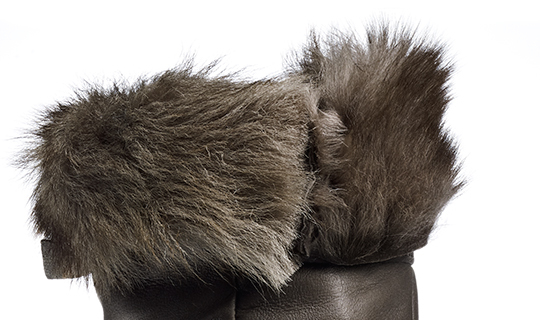





mpc - military post-consumer
Vintage discarded green military tent tarpaulins.
Features sturdy cotton construction. A circular material used in our t-project styles.


mse - muse
Chrome-tanned nubuck calf leather sourced from an Italian (Tuscany) supplier. Features a tumbled finish and rich oil treatment, making it extremely soft in both appearance and feel. The darker surface layer adds visual depth to the velvety material. Not recommended for people with chrome allergies.
Care guide
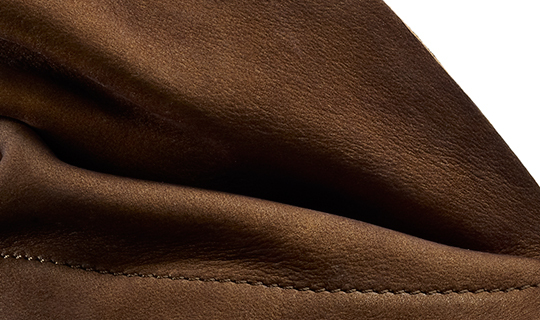












nub - nubuk
Vegetable-tanned thick nubuck calf leather sourced from an Italian (Tuscany) supplier. Some light colors are metal-free tanned instead of vegetable-tanned to ensure color stability. Features a sanded grain side that creates a suede surface. The color will get darker with wear and exposure to sunlight.
The dye can stain your feet. It gets softer with use and may stretch.
Care guide
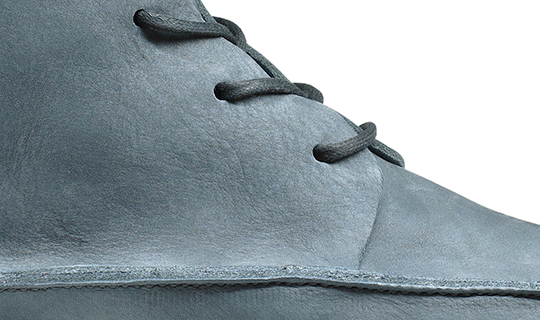










pep - pepita
Vegetable-tanned calf leather sourced from an Italian (Tuscany) supplier. Features dual usability: either with the grain side outwards or with the flesh side, which is coated with a slightly silvery pigment.
The irregular pigment coating will wear away with use and friction.
Care guide
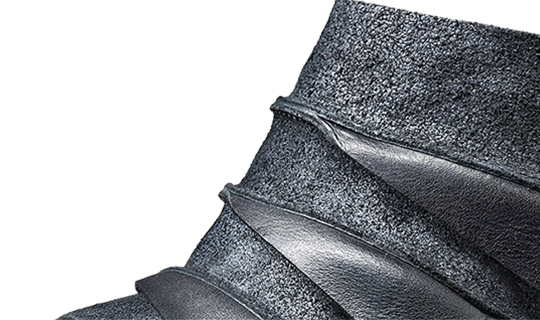



pst - post
Vintage discarded Belgian mailbags from the 1960s. Features sturdy linen canvas construction. A circular material used in our t-project styles.
Care guide
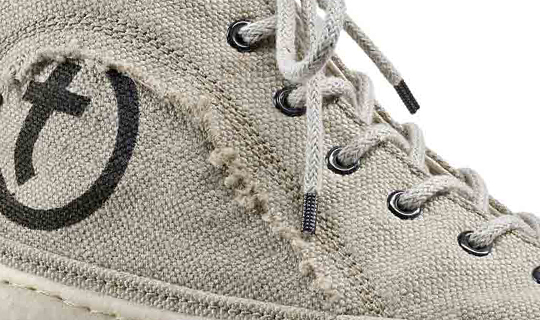

pub - pull-up buffalo
Vegetable-tanned buffalo leather sourced from an Italian (Tuscany) supplier. Features an oiled and waxed surface with pull-up effect. The color will get darker with wear and exposure to sunlight. The dye can stain your feet.
Care guide
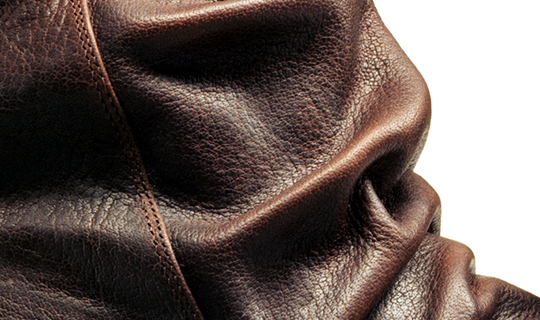















pul - pull-up leather
Vegetable-tanned nubuck calf leather sourced from an Italian (Tuscany) supplier. Features an oiled and waxed surface with pull-up effect. Marks and color irregularities are natural characteristics of this leather. The color will get darker with wear and exposure to sunlight. The dye can stain your feet.
It gets softer with use and may stretch.
Care guide
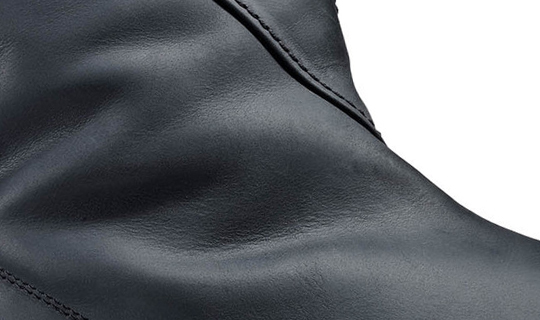




rub - rubber
Rubber sheet, 2 mm thick. Features use as a protective layer and design element in certain styles.

Vegetable-tanned calf leather sourced from an Italian (Tuscany) supplier. Some colors, mostly the light ones (such as white, perla, rose, sky, kobalt, lime, azur, pulpo, and coral), are not vegetable-tanned but metal-free tanned to ensure color stability. Features a thin and soft construction that gives an elegant but delicate quality. It should not be exposed to moisture or heat. The color will get darker with wear and exposure to sunlight.
Care guide
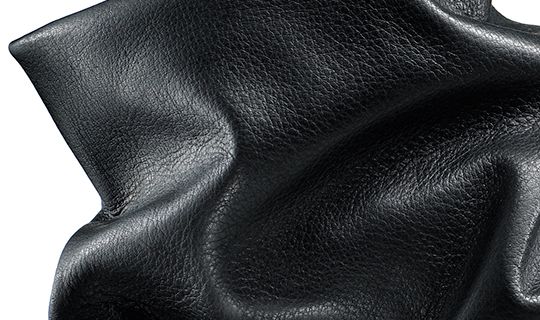



















sft - soft
Chrome-tanned calf leather sourced from an Italian (Tuscany) supplier. Features a tumbled finish for softness. Color and texture may vary as a result of the tumbling process. The material is delicate due to its thinness and should not be exposed to moisture or heat. Metallic colors are especially sensitive to scratches and surface damage. Not recommended for people with chrome allergies.
Care guide

























str - strick
Knitted fabrics.
Features different yarn compositions depending on the model. In t-project Revive and Reason styles, the patterns “seagull” and “blackclouds” are produced in-house with synthetic yarn from a Spanish manufacturer certified by OEKO-TEX and Global Recycled Standard. This yarn is composed of 90% PET bottles and 10% ocean plastic. The manufacturer guarantees take-back and recycling. Other colors are knitted with 100% viscose yarn combined with a thin elastane thread to ensure fit. These were developed with CASE STUDIES for the ankle-high sock shoes made in collaboration. The elastic knitted fabric encloses the foot ergonomically, ensuring a pleasant foot climate even in warm weather.
Care guide
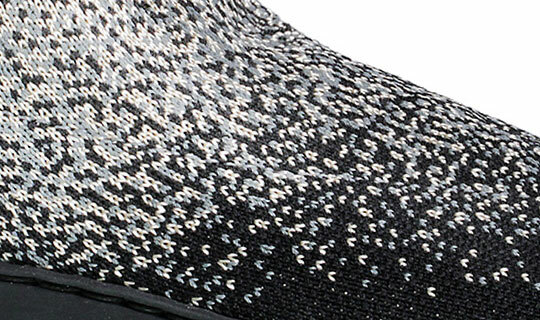







stx - saturnia lux
Vegetable-tanned calf leather. Features the same qualities as our regular Saturnia leather (see sat) with the addition of an elegant, glossy finish.
Care guide
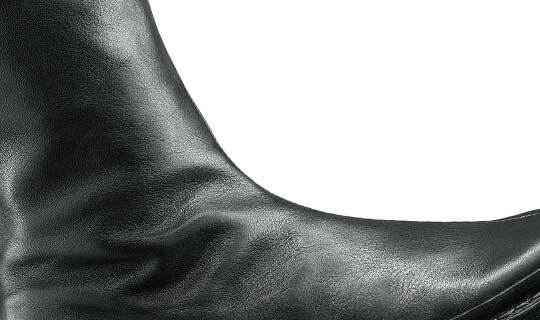

sde - suede
Vegetable-tanned calf leather sourced from an Italian (Tuscany) supplier. Some colors, mostly the light ones (such as perla and lime), are not vegetable-tanned but metal-free tanned in order to keep the color stable.
Made on the base of our waw leather, its surface is sanded to achieve the suede look.





tdy - top dye
Metal-free tanned calf leather sourced from an Italian (Tuscany) supplier. Features surface dyeing without washing out, unlike through-dyed leathers. This process reduces water consumption by 20% and leaves a white cut edge, creating an interesting color contrast.
Care guide









tiz - tiziano
Vegetable-tanned, aniline-dyed soft calf leather sourced from an Italian (Tuscany) supplier. Features a suede surface and natural markings that give the material a vintage look. It gets softer with use and may stretch substantially.
Care guide
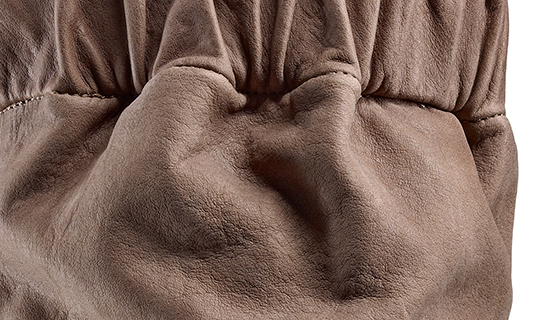






tube
Soft leather pipings covered with sft, waw, or sat leather and filled with different materials from the supplier. Features use as detailing elements in various styles.

















veg - vegan
Synthetic material. Features a velvety surface reminiscent of suede.
Used in our Zori and Zig Zag models.
Care guide



vst - vegetable soft
Synthetically pre-tanned and vegetable re-tanned, chrome-free calf leather sourced from a German supplier. Features exceptional softness and a natural surface structure with light pigmentation. The color will get darker with wear and exposure to sunlight. It gets softer with use and may stretch substantially. It is sensitive to staining, moisture, and scratches.
Care guide
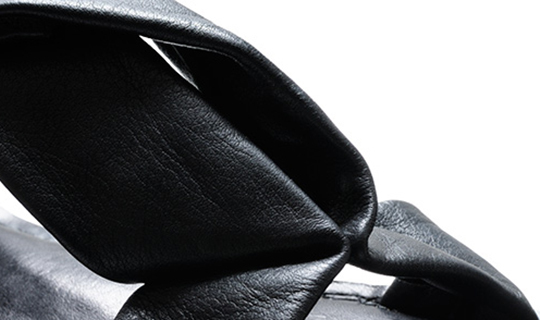









wab - washed buffalo
Vegetable-tanned, washed buffalo leather sourced from an Italian (Tuscany) supplier. Features a distinctive grain pattern. It is very thin but nonetheless sturdy. The color will get darker with wear and exposure to sunlight.
Care guide
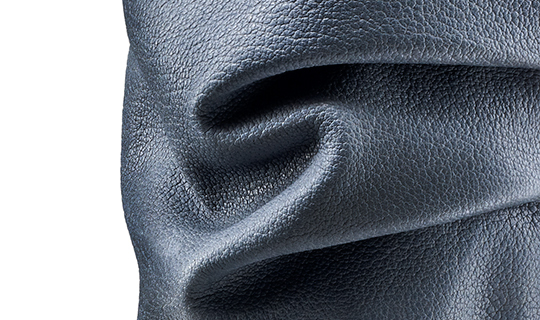








wax
Vegetable-tanned calf leather sourced from an Italian (Tuscany) supplier. Features a wax finish and pull-up effect. The color will get darker with wear and exposure to sunlight. The dye can stain your feet. It gets softer with use and may stretch.
Care guide
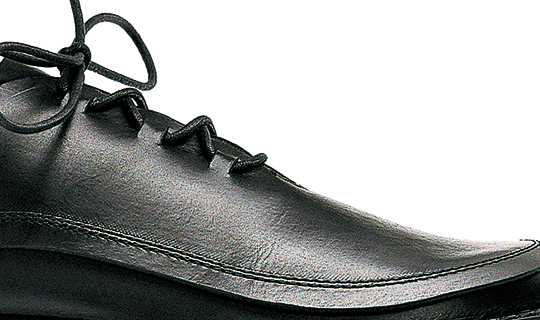















lining
Vegetable-tanned calf leather.
Features an undyed, tumbled finish for softness.



waw
Vegetable-tanned calf leather sourced from an Italian (Tuscany) supplier. Some colors, mostly the light ones (such as white, perla, rose, sky, kobalt, lime, azur, pulpo, and coral), are not vegetable-tanned but metal-free tanned in order to keep the color stable. Features a through-dye and wax finish with a light pull-up effect. It is tumbled for softness, and color and texture may vary as a result of the tumbling process. The color will get darker with wear and exposure to sunlight. The dye can stain your feet. It gets softer with use and may stretch. The bi-leather colors are dyed twice and therefore display a different color edge.
Care guide











































acf - aspen chrome-free
Chrome-free, vegetable post-tanned calf leather sourced from a German supplier. Features an oiled surface and pull-up effect.
Marks and irregularities in color are natural characteristics of the leather. The color will get darker with wear and exposure to sunlight. It gets softer with use and may stretch.
Care guide







alb - albino
Metal-free tanned deer leather, sourced from New Zealand farmers and tanned in Tuscany, Italy. Features extreme softness, flexibility, and comfort without the use of chrome tanning. It is sensitive to scratches, abrasions, and stains. It gets softer with use, may stretch substantially, and generally ages faster than other leathers.















asp - aspen
Chrome-tanned calf leather sourced from a German supplier. Features an oiled surface and pull-up effect. It gets softer with use and may stretch. Not recommended for people with chrome allergies.
Care guide










bat - batik
Half vegetable-tanned, half metal-free tanned calf leather sourced from an Italian (Tuscany) supplier. Features a tumbled finish for softness.
Color and texture may vary as a result of the tumbling process. The color will get darker with wear and exposure to sunlight. It gets softer with use and may stretch. The vibrant colors are especially sensitive to staining, moisture, and scratches.
Care guide










bgl - bag leather
Vegetable-tanned calf leather sourced from an Italian (Tuscany) supplier. Features a covering coat of color and a tumbled finish for softness. Color and texture may vary as a result of the tumbling process. The color will get darker with wear and exposure to sunlight. Especially designed for our bags, it has a protective coating on the surface; however, it may still bleed when exposed to moisture.
Care guide







bglto - bag leather leftovers
Small leftovers of our bgl leather, repurposed in some T-Project zero-waste styles. Features the same protective qualities and finish as bgl leather.
Care guide





box
Chrome-tanned calf leather sourced from a German supplier. Features a covering coat of color and good color stability. It is more resistant to water stains and general signs of wear and tear. Not recommended for people with chrome allergies.
Care guide








box-h
Chrome-tanned calf leather sourced from a German supplier. Features a covering coat of color and good color stability. It is more resistant to water stains and general signs of wear and tear. Not recommended for people with chrome allergies.
Care guide

bug - buffalo shiny
Vegetable-tanned buffalo leather sourced from an Italian (Tuscany) supplier. Features a shiny surface and irregular texture. The color will get darker with wear and exposure to sunlight. It gets softer with use and may stretch.
It is sturdier than other leathers as a result of its thickness.
Care guide












buf - buffalo
Vegetable-tanned buffalo leather sourced from an Italian (Tuscany) supplier. Features an oiled surface and irregular texture. The color will get darker with wear and exposure to sunlight. It gets softer with use and may stretch. It is sturdier than other leathers as a result of its thickness.
Care guide

cap - capra
Long-haired chrome-tanned Tibetan goatskin. Features a soft, long-haired surface. Not recommended for people with chrome allergies.
Care guide





cav - cavallin
Chrome-tanned cow leather sourced from an Italian (Tuscany) supplier.
Features the natural cow hair structure on the surface. Not recommended for people with chrome allergies.
Care guide





cot - cotton
Soft cotton fabric, hand-dyed by us. Features unique batik patterns and color gradients on each piece. The fabric’s raw edges underline the casual grunge look. The batik colors can lighten over time due to sunlight exposure.
Care guide







crd - cord
Vegetable-tanned cow leather sourced from an Italian (Tuscany) supplier. Features a tumbled finish and an embossed surface with a striped pattern.
The embossing process increases its stiffness compared to other types, but with use it gradually regains some of its softness.
Care guide




ctn - cotton
100% recycled and GRS-certified cotton fabric from Switzerland. Features a special weaving process that creates a highly water-repellent surface.
No chemical additives or finishes are used, therefore it cannot be categorized as fully waterproof.
Care guide


der - deer
Vegetable-tanned deer leather sourced from an Italian (Tuscany) supplier. Features exceptional softness, rivaling our elk leather, with a slightly more robust surface thanks to the tanning process.
Care guide



dev
Vegetable-tanned cow leather sourced from an Italian (Tuscany) supplier. Features a tumbled finish for softness and a thin layer of silvery, gleaming wax on the surface. The colors underneath remain clearly visible. The wax finish is relatively resilient but may wear away with intense friction.
Care guide







dplx - duplex
Vegetable-tanned calf leather sourced from an Italian (Tuscany) supplier. Features a double-dye process that creates a contrasting color edge. The color will get darker with wear and exposure to sunlight. The dye can stain your feet. It gets softer with use and may stretch.
Care guide





dpw
Vegetable-tanned, aniline-dyed calf leather sourced from an Italian (Tuscany) supplier. Features a tumbled finish for softness. Color and texture may vary as a result of the tumbling process. It is double-dyed, creating a contrasting edge. The color will get darker with wear and exposure to sunlight. The dye can stain your feet. It gets softer with use and may stretch substantially.
Care guide











elk
Chrome-tanned deer leather sourced from an Italian (Tuscany) supplier. Features exceptional softness, flexibility, and comfort. It has a covering coat of color and a highly textured, irregular surface that is sensitive to scratches, abrasions, and stains. The dye can stain your feet. It gets softer with use, may stretch substantially, and generally ages faster than other leathers. Not recommended for people with chrome allergies.
Care guide










glm - glam
Vegetable-tanned, thin buffalo leather sourced from an Italian (Tuscany) supplier. Features a pull-up effect and an extremely shiny, hand-colored surface. The manual coloring gives the material a vivid look, but the color may stain your feet. The color will get darker with wear and exposure to sunlight. It gets softer with use and may stretch. The vibrant colors are especially sensitive to staining, moisture, and scratches.
Care guide






ice
Vegetable-tanned calf leather sourced from an Italian (Tuscany) supplier. Features a white soap-wax glazing that wears away with use, leaving a vintage look.
The color will get darker with wear and exposure to sunlight. It gets softer with use and may stretch.
Care guide









jea - jeans
Post-consumer jeans sourced from sorted clothing donations in Berlin, focusing on pure cotton composition. Features variations in shade, brightness, and thickness due to its origin.
These differences are expressed in the t-project styles "Aware" and "Beware".
Care guide



ken - kenya
Vegetable-tanned calf leather sourced from an Italian (Tuscany) supplier. Features a covering coat of color, an additional glossy varnish, and a light pull-up effect.
Care guide


lam - laminato
Vegetable-tanned calf leather sourced from an Italian (Tuscany) supplier. Features a laminated surface with metallic-colored foil. Like all shiny leathers, it is sensitive to scratches and other surface damage. It gets softer with use and may stretch.
Care guide

















lav - lavato
Chrome-tanned, cotton-lined calfskin, dyed and hand-washed by us to create a batik effect. Features uneven coloring that makes each shoe unique. To us, this material is more than just leather — it is a piece of art. It can stretch unevenly, and color may bleed. Not recommended for people with chrome allergies.
Care guide










lea
Regenerated leather material developed in-house using offcuts accumulated during production. Features small rectangular scraps that are glued together into new sheets, which are then sanded to achieve a smooth surface.
Patches of vegetable- and metal-free tanned leathers blend almost seamlessly.
Care guide













lff
Chromefree sheepskin. Features the natural shearling fur structure.
Used for lining and footbeds.


lht - light
Vegetable-tanned cow leather sourced from an Italian (Tuscany) supplier. Features a tumbled and washed finish. Due to the washing process, the colors fade and the leather’s structure becomes more visible.
The look recalls a favorite pair of washed-out jeans. It gets softer with use and may stretch.
Care guide







lux - luxury
Chrome-tanned calf leather sourced from an Italian (Tuscany) supplier. Features a covering coat of color, a tumbled finish for softness, and a glossy varnish.
The bright colors are resistant to fading. This elegant, delicate, and thin material is sensitive to moisture and heat. Not recommended for people with chrome allergies.
Care guide






lxp
Vegetable-tanned calf leather sourced from an Italian (Tuscany) supplier. Features a subtle pull-up effect and a high-gloss surface. The glossy finish and brilliant colors ensure that this leather is the epitome of elegance. It gets softer with use and may stretch.
Care guide














mfl - muflone
Chrome-tanned shrunk sheepskin sourced from an Italian (Tuscany) supplier. Features a heavily textured surface and irregular grain created by a shrinking process. It is extremely soft, flexible, and pleasant to wear. It gets softer with use, may stretch substantially, and generally ages faster than other leathers. It is sensitive to scratches, abrasions, and stains.
Not recommended for people with chrome allergies.
Care guide












mon - montone
Chrome-tanned sheepskin sourced from an Italian (Tuscany) supplier.
Features the natural sheep hair structure on the surface.
Not recommended for people with chrome allergies.
Care guide








mpc - military post-consumer
Vintage discarded green military tent tarpaulins.
Features sturdy cotton construction. A circular material used in our t-project styles.


mse - muse
Chrome-tanned nubuck calf leather sourced from an Italian (Tuscany) supplier. Features a tumbled finish and rich oil treatment, making it extremely soft in both appearance and feel. The darker surface layer adds visual depth to the velvety material. Not recommended for people with chrome allergies.
Care guide











nub - nubuk
Vegetable-tanned thick nubuck calf leather sourced from an Italian (Tuscany) supplier. Some light colors are metal-free tanned instead of vegetable-tanned to ensure color stability. Features a sanded grain side that creates a suede surface. The color will get darker with wear and exposure to sunlight.
The dye can stain your feet. It gets softer with use and may stretch.
Care guide











pep - pepita
Vegetable-tanned calf leather sourced from an Italian (Tuscany) supplier. Features dual usability: either with the grain side outwards or with the flesh side, which is coated with a slightly silvery pigment.
The irregular pigment coating will wear away with use and friction.
Care guide






pst - post
Vintage discarded Belgian mailbags from the 1960s. Features sturdy linen canvas construction. A circular material used in our t-project styles.
Care guide


pub - pull-up buffalo
Vegetable-tanned buffalo leather sourced from an Italian (Tuscany) supplier. Features an oiled and waxed surface with pull-up effect. The color will get darker with wear and exposure to sunlight. The dye can stain your feet.
Care guide














pul - pull-up leather
Vegetable-tanned nubuck calf leather sourced from an Italian (Tuscany) supplier. Features an oiled and waxed surface with pull-up effect. Marks and color irregularities are natural characteristics of this leather. The color will get darker with wear and exposure to sunlight. The dye can stain your feet.
It gets softer with use and may stretch.
Care guide





rub - rubber
Rubber sheet, 2 mm thick. Features use as a protective layer and design element in certain styles.



Vegetable-tanned calf leather sourced from an Italian (Tuscany) supplier. Some colors, mostly the light ones (such as white, perla, rose, sky, kobalt, lime, azur, pulpo, and coral), are not vegetable-tanned but metal-free tanned to ensure color stability. Features a thin and soft construction that gives an elegant but delicate quality. It should not be exposed to moisture or heat. The color will get darker with wear and exposure to sunlight.
Care guide




















sft - soft
Chrome-tanned calf leather sourced from an Italian (Tuscany) supplier. Features a tumbled finish for softness. Color and texture may vary as a result of the tumbling process. The material is delicate due to its thinness and should not be exposed to moisture or heat. Metallic colors are especially sensitive to scratches and surface damage. Not recommended for people with chrome allergies.
Care guide























str - strick
Knitted fabrics.
Features different yarn compositions depending on the model. In t-project Revive and Reason styles, the patterns “seagull” and “blackclouds” are produced in-house with synthetic yarn from a Spanish manufacturer certified by OEKO-TEX and Global Recycled Standard. This yarn is composed of 90% PET bottles and 10% ocean plastic. The manufacturer guarantees take-back and recycling. Other colors are knitted with 100% viscose yarn combined with a thin elastane thread to ensure fit. These were developed with CASE STUDIES for the ankle-high sock shoes made in collaboration. The elastic knitted fabric encloses the foot ergonomically, ensuring a pleasant foot climate even in warm weather.
Care guide








stx - saturnia lux
Vegetable-tanned calf leather. Features the same qualities as our regular Saturnia leather (see sat) with the addition of an elegant, glossy finish.
Care guide




sde - suede
Vegetable-tanned calf leather sourced from an Italian (Tuscany) supplier. Some colors, mostly the light ones (such as perla and lime), are not vegetable-tanned but metal-free tanned in order to keep the color stable.
Made on the base of our waw leather, its surface is sanded to achieve the suede look.





tdy - top dye
Metal-free tanned calf leather sourced from an Italian (Tuscany) supplier. Features surface dyeing without washing out, unlike through-dyed leathers. This process reduces water consumption by 20% and leaves a white cut edge, creating an interesting color contrast.
Care guide







tiz - tiziano
Vegetable-tanned, aniline-dyed soft calf leather sourced from an Italian (Tuscany) supplier. Features a suede surface and natural markings that give the material a vintage look. It gets softer with use and may stretch substantially.
Care guide







tube
Soft leather pipings covered with sft, waw, or sat leather and filled with different materials from the supplier. Features use as detailing elements in various styles.



















veg - vegan
Synthetic material. Features a velvety surface reminiscent of suede.
Used in our Zori and Zig Zag models.
Care guide



vst - vegetable soft
Synthetically pre-tanned and vegetable re-tanned, chrome-free calf leather sourced from a German supplier. Features exceptional softness and a natural surface structure with light pigmentation. The color will get darker with wear and exposure to sunlight. It gets softer with use and may stretch substantially. It is sensitive to staining, moisture, and scratches.
Care guide









wab - washed buffalo
Vegetable-tanned, washed buffalo leather sourced from an Italian (Tuscany) supplier. Features a distinctive grain pattern. It is very thin but nonetheless sturdy. The color will get darker with wear and exposure to sunlight.
Care guide









wax
Vegetable-tanned calf leather sourced from an Italian (Tuscany) supplier. Features a wax finish and pull-up effect. The color will get darker with wear and exposure to sunlight. The dye can stain your feet. It gets softer with use and may stretch.
Care guide

















lining
Vegetable-tanned calf leather.
Features an undyed, tumbled finish for softness.














